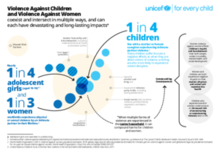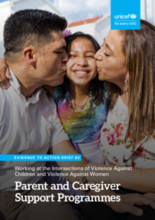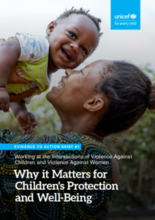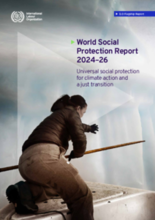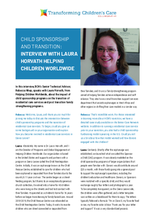Displaying 71 - 80 of 4272
The Transitioning Residential Care Working Group, part of the Transforming Children’s Care Collaborative, invites practitioners, advocates, organizations, and donors supporting and promoting residential care service transitions to the launch webinar of the Divesting of Residential Care Guidelines and Transition Monitoring Tool.
This infographic by UNICEF illustrates how violence against children and violence against women coexist and intersect in multiple ways, and can each have devastating and long-lasting impacts.
A well-established and growing body of evidence demonstrates the multiple ways in which violence against children and violence against women intersect or overlap. This brief summarizes what is known about the potential for parent and caregiver support programmes to reduce both violence against children and violence against women, and why addressing these intersections matters for children’s protection and well-being.
A well-established and growing body of evidence demonstrates the multiple ways in which violence against children and violence against women intersect or overlap.
This is the Executive Summary of the World Social Protection Report 2024-26: Universal Social Protection for Climate Action and a Just Transition which provides a global overview of progress made around the world since 2015 in extending social protection and building rights-based social protection systems. It calls on policymakers, social partners and other stakeholders to accelerate their efforts to simultaneously close protection gaps and realize climate ambitions.
With a sharp focus on the climate crisis, this report provides a global overview of progress made around the world since 2015 in extending social protection and building rights-based social protection systems. In doing so, it makes an essential contribution to the monitoring framework of the 2030 Agenda for Sustainable Development. And it calls on policymakers, social partners and other stakeholders to accelerate their efforts to simultaneously close protection gaps and realize climate ambitions.
The purpose of the tool is to assist technical support practitioners to closely track and monitor the progress of residential care services transitions they are involved in. It can be used as a workplan to guide the implementation of a transition strategy, allowing practitioners to identify relevant transition activities, set progress-related goals, and monitor progress against those goals.
In this interview, BCN’s Senior Technical Advisor, Rebecca Nhep, speaks with Laura Horvath, from Helping Children Worldwide, about the impact of child sponsorship programs on the transition of residential care services and post transition family strengthening programs.
In this workshop panelists explored UNICEF's Data and Analytics Section's protocols and tools for gathering data on children in residential care.
Attention child protection professionals, share your insights on alternative care in humanitarian settings. Your feedback will shape new resources and updates to the ACE Toolkit which is critical for both humanitarian and development actors working in alternative care and care reform. Deadline is September 27.

